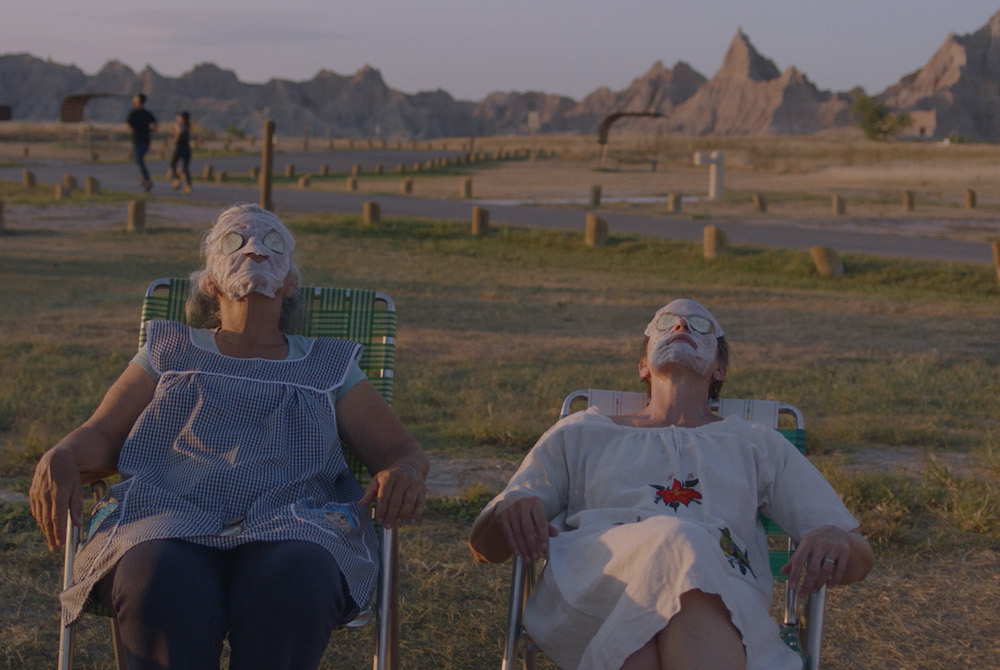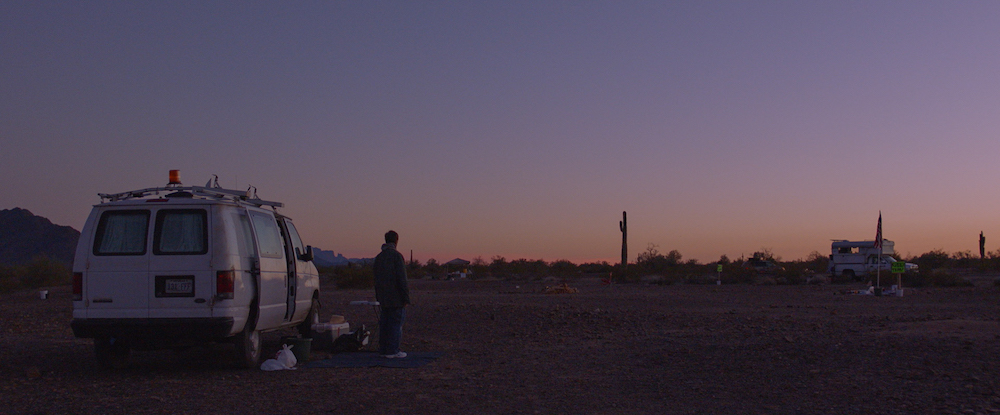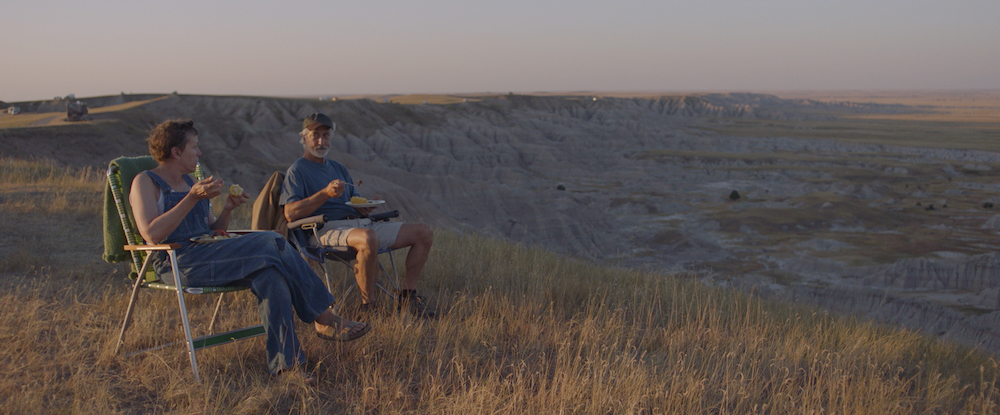
Linda May plays herself, left, alongside Frances McDormand as Fern in the film "Nomadland." Here, the two take part in a "Badlands spa" experience. (©20th Century Studios/Courtesy of Searchlight Pictures)
Movies are built around quests. They can be big sweeping "Save the World" kind of things — Batman, Superman and Wonder Woman trying to prevent invasion from a mad god and his hell planet — or goals more personal, like a queer girl trying to go to prom.
They can be hilarious, like Julia Roberts chasing Dermot Mulroney in "My Best Friend's Wedding," or just plain absurd, like Bruce Dern traveling from Billings to Lincoln in "Nebraska" because he doesn't understand that sweepstakes mailers are lying when they say you've just won a million dollars.
No matter the specifics, in most films there's something concrete out there the protagonist is after, something they're going to fight for and a journey we're going to take with them.
Oscar-nominated film "Nomadland" is very aware of this conceit.
Written and directed by Chloé Zhao, based on a book by Jessica Bruder, the film is about Fern, a late middle-aged widow in a dying Nevada town who decides to live indefinitely in her van as she travels from temp job to temp job around the Western U.S. As portrayed by Frances McDormand, Fern is defiant and enigmatic. It's clear that she has known great suffering in her life, but she will not talk about it, she will not accept help.
And she will not undertake the standard trauma film quest for healing or redemption, either. In fact "Nomadland" draws strength from Fern's persistent refusal to take the journey the world wants and expects. Her quest is simply to live her life on her own terms, broken though she may be; to be able to wander through a trailer park on New Year's Eve waving sparklers and saying hello to all the other nomads she meets, then get in her van the next day and go. That others might think it unnecessary or sad is irrelevant. What do they know?
"You are not required to get over the traumas of your life," a character explains to her near the end. "It's okay if you can't or you don't."
Advertisement
Those words, that scene and this film were all conceived long before any thought of a global pandemic that would leave us isolated for a full year. And yet I find "Nomadland" resonates deeply with my own experience of our reality.
With few small exceptions — the student nurse from whom I receive my weekly COVID-19 test; the tow truck guy who jumped my battery after I hadn't driven my car in five months; the dentist; and a handful of experiences with food delivery drivers — I've had contact with almost no one for a full year.
Even acknowledging the obvious reasons for that, still I feel like I've admitted something embarrassing. My immediate instinct is to make clear to you, I am not a member of QAnon, I have tried to be helpful and a good person in my own ways and I have had plenty of human contact online. As a Jesuit living in a university community, I have had plenty of opportunity for in-person contact, too; I just haven't been able to figure out for myself the choreography of living with 35 other men in the midst of a pandemic.
So instead, I've danced alongside the edges of community, doing the same two-step as everyone else but in a parallel timeline. I've cooked meals in one of our shared kitchens when others are at Mass, done laundry in the middle of the night and taken walks on the campus where I live after everyone has gone home.
Some days the demons have come, as they've come for all of us whether we've been living alone or in larger groups the last year. Old resentments fester; doubts and self-condemnation creep in like mold at the corners of the room.

Frances McDormand in Chloé Zhao's Oscar-nominated film "Nomadland," which is not a documentary but blurs the line of fiction and reality in a story about a woman living on the road. (©20th Century Studios/Courtesy of Searchlight Pictures)
But in isolation it seems like I've also stumbled into a little more room for me in my life. It's said that the desert is a holy place because there's nowhere there to hide. Every person I get mad at, every argument I have — it's all just me, playing all the parts. In the moments that I realize that, they lose some of their power. (St. Ignatius used to say bad spirits like to be hidden. I think more often they're like dogs, nipping at our heels, anxious to be engaged with. Maybe they get lonely, too.)
There's also unexpected relief in being forced to confront limitations you cannot seem to overcome. It's as though finally you can stop pretending. I can't run a 6-minute mile, I will never not be restless and also I can't be in a room with three dozen other people right now, even if it is a very large one and they're all wearing masks. So it goes.
And I've been surprised to find that new life can bloom even in isolation. In this strange time I've become friends online with relative strangers, something I've never done before, and had conversations with people I know well that have seemed somehow deeper for our separation.
I've also felt the chilly autumn breeze curl across the back of my neck as I watch yet another old-school British detective show, spent two fabulous weeks with Pedro Almodóvar in Spain (5 stars; highly recommend his work), and felt the hot red dirt of the Australian Outback stain my fingers as I wandered with Detective Jay Swan through another bush town. It's strange to say, but somehow via all the movies, TV shows and other pop culture I've consumed I feel like I've traveled more in this year of isolation than I ever have before, right down to that sense of wonder that rises up sometimes when you turn a corner in a new place and there's that building you've only seen before in the movies, and suddenly you realize, This is actually happening, I'm really here.

Frances McDormand as Fern and David Strathairn as Dave in the film "Nomadland" (©20th Century Studios/Courtesy of Searchlight Pictures)
Most movies are built around quests for a reason. Not only are they exciting, they make things clear. Like a flashlight in a dark room, the mission of the hero in a films gives us a sense of direction. We may not know how to get there, but we know where we're going.
Except in the last year we haven't, really. The quest has just been to find a way to live through this, with no sense of how long we would have to and no guide as to what doing it "right" might look like. I hear the questions creeping in now in conversations: Was I there for others? Have I gotten enough done? Could I have risked more? Have I spent the year afraid?
In a way "Nomadland" is the perfect film for this moment of transition as well. Its quiet, haunting story invites us into a space of contemplation where we can witness from outside some of the pressures that have pushed and pulled against us in our crazy pandemic lives and lay claim to our own choices, whatever they have been.
It would be nice if the world were different, if we were different, if we were better. But there is also blessing to be found in being limited, in being broken, in being alone.








